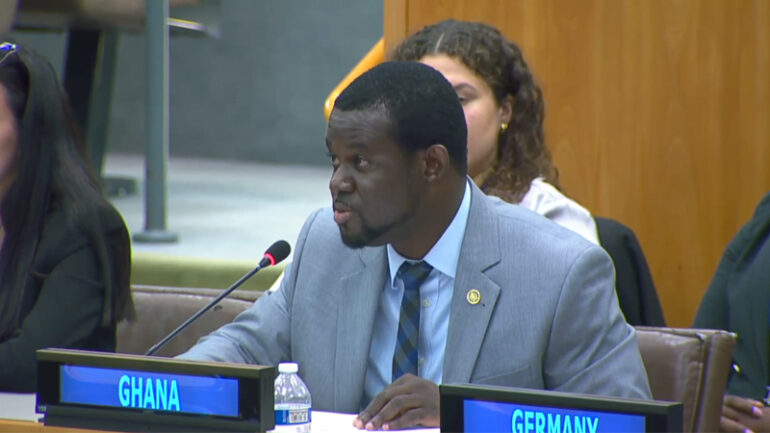Third Committee, 6th plenary meeting – United Nations General Assembly, 78th session

- Posted by admin
- Posted in Statement & Remarks
Bismark Anyanah
Minister Counsellor/ Deputy Political Coordinator
Permanent Mission of Ghana
United Nations, New York
THIRD COMMITTEE MEETING OF THE 78TH SESSION OF THE UNITED NATIONS GENERAL ASSEMBLY
AGENDA: Item 109 Crime prevention and criminal justice
Mr. Chair,
At the outset, I wish to congratulate you on your election as Chair of this Committee and to assure you of Ghana’s cooperation. We also thank the Secretary-General for his comprehensive report under this agenda item.
Mr. Chair,
Despite the saliency of crime prevention and criminal justice to the realization of Goal 16 on Peaceful Just and Inclusive Societies, we remain worried about the increasing incidence of crime and the travesty of justice. We therefore urge urgent efforts to enhance rule of law, human rights, socioeconomic development, public health and security, among others. In this regard, we urge global support for national actions that would address related challenges such as funding, human resource, and capacity gaps especially among developing countries, and in some cases the absence of appropriate policies.
In this statement, Ghana would like to highlight the following points:
First, we believe that multilateral instruments such as the UN Convention against Transnational Organized Crime and its three supplementary protocols including Trafficking in Persons provide a useful framework to support the efforts of Member States in addressing the concern.
While reiterating the importance of the commitment of Member States in implementing their international obligations, we underscore the critical role of the Commission on Crime Prevention and Criminal Justice (CCPCJ), which is the principal policymaking body of the UN on the issue. We also recognise the critical role of the UNODC and believe that sustained support for its work is also instrumental in advancing this noble course. We further urge the implementation of the forward-looking recommendations in the Kyoto Declaration.
Secondly, we must advance measures to address the funding, technical and capacity gaps impeding the progress of developing countries in tackling the issue. In this regard, we welcome the increase in funding support from donor partners and believe that the critical support for the role of the UNODC as well as other stakeholders should be sustained.
Thirdly, we should prioritize the implementation of regional instruments designed to prevent crime and ensure criminal justice. In this context, we welcome efforts to deepen the implementation of regional mechanisms such as the ECOWAS Plan of Action to Combat Trafficking in Persons and the Convention on Mutual Assistance in Criminal Matters as well as the AU Plan of Action on Drug Control and Crime Prevention (2019-2023). These regional instruments complement global efforts in combating the menace sustainably.
Fourthly, we must encourage the adoption of measures to address the root causes of crime, including policies that would resolve the governance and development deficits. This should be accompanied by efforts to integrate gender perspectives into crime prevention policies. It would also be useful to create an environment that empowers women and the youth to become active agents of positive change in their communities to support crime prevention efforts. A multistakeholder partnership with the private sector, civil society, academia and the scientific community, and with other relevant stakeholders as appropriate should be embraced.
At the national level, the government of Ghana remains resolute in her commitment to combating crime and enhancing the administration of justice. This is being done through a re-tooling of the law enforcement agencies and judicial reforms and improvements, including collaborative initiatives such as the ‘Justice for All Programme’. The programme seeks to ensure that justice is being served to all Ghanaian citizens in a fair and timely manner, and more importantly helping to de-congest the prisons, especially of remand prisoners. The initiative has so far contributed to the reduction of Ghana’s remand prisoner population from 33% in 2007, to 9.8% as of July 2023.
In conclusion, I wish to re-affirm Ghana’s commitment to implementing her obligations under multilateral and regional arrangements in combating crime and call for deeper cooperation among Member States. The crusade against crime and effective administration of justice can be won if political will and cooperation is demonstrated at all levels.
I thank you.
